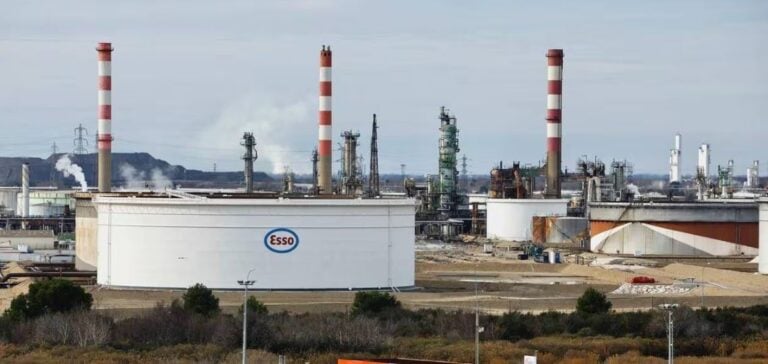The American oil giant ExxonMobil has announced the completion of the sale of its Fos-sur-Mer refinery, located in southern France, along with two storage terminals. The transaction, concluded on November 1, marks a shift towards a broader reorganization of its operations in Europe. The new buyer, Rhône Energies, is a Swiss consortium consisting of commodity trading firm Trafigura and refinery operator Entara, specializing in the hydrocarbon sector.
Rhône Energies issued a statement expressing satisfaction with this strategic acquisition. According to Nicholas Myerson, CEO of Rhône Energies, the group’s priority will be to ensure “the health and safety of employees, environmental performance, and social dialogue” at the Fos-sur-Mer site. The consortium has committed to maintaining the jobs of the refinery’s 310 current employees, a key industrial site in the region with a processing capacity of 140,000 barrels per day.
ExxonMobil’s strategy to reduce activities in France
This sale follows an announcement from ExxonMobil in April, where the group disclosed a strategy to downscale its activities in France. This restructuring also affected the Port-Jérôme site in Normandy, where the company had indicated plans to eliminate 677 positions. In the case of Fos-sur-Mer, this sale reflects an adaptation to evolving market trends, which have negatively impacted the demand for traditional petroleum products.
With the transition to less polluting heating methods and a decreasing reliance on fuel oil, particularly for domestic heating, French refineries are experiencing a notable drop in activity. The progressive electrification of transportation, encouraged by European decarbonization policies, is also reducing the demand for fossil fuels, complicating the operation of sites like Fos-sur-Mer.
Context and challenges for Rhône Energies
The acquisition of the Fos-sur-Mer refinery represents an opportunity for Rhône Energies to expand its capacities in Europe, within a sector undergoing significant transformations. By taking over French sites, the consortium aims to improve their environmental performance and strengthen their competitiveness. Rhône Energies’ vision appears to be oriented toward modernizing energy infrastructure management, focusing on sustainable practices and social dialogue.
According to the statement, Rhône Energies may explore new adaptation paths for these sites, in response to regulatory developments and new expectations related to energy transition. This could involve investments in cleaner technologies and operational efficiency improvements, in line with European CO₂ emission reduction standards.
Impact on the energy sector in France
This sale is part of a broader reorganization of French oil platforms, which face pressure from changing consumer behavior and new climate legislation. The closures and reductions in activities at refineries across the country reflect the impact of declining demand for petroleum products and the need for the sector to adapt to alternative energy sources.
Market experts anticipate that other oil companies may pursue similar strategies, either by closing sites or selling assets to companies capable of modernizing these facilities. For workers in the sector, this often involves uncertainty regarding job stability but also the hope that these reorganizations may lead to jobs better suited to climate challenges.





















